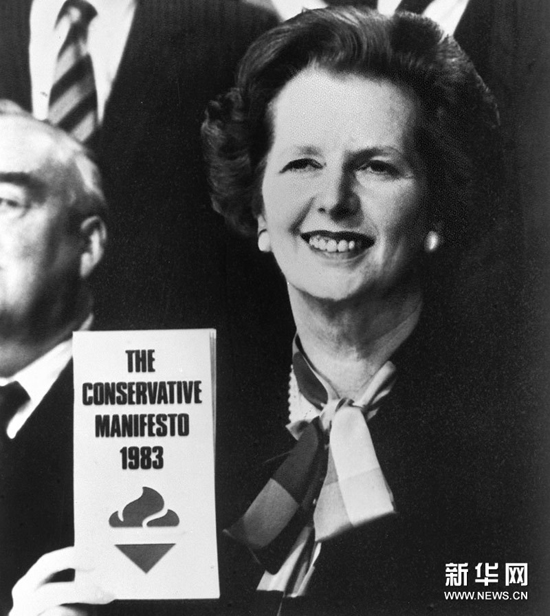Margaret Thatcher the Death of a Shopkeeper
- By Heiko Khoo
 0 Comment(s)
0 Comment(s) Print
Print E-mail China.org.cn, April 9, 2013
E-mail China.org.cn, April 9, 2013
|
|
|
Margaret Thatcher [Xinhua File Photo] |
The shopkeeper insider her, meant she automatically gravitated toward economic theory based on price. Her ideology imagined a world of free and unrestricted competitive pressures where atomized individuals replace organized workers. The pathway to this free market utopia involved selling off state resources and public housing at prices that were absurdly low. This created a significant constituency within the working and middle classes who suddenly acquired money from nothing. In this way the shopkeeper’s delusion, that an economy is simply a nation of buyers and sellers, was materially anchored in the minds of those who suddenly had loads of money. In this way a significant minority acquired a material stake in Thatcher’s “property owning democracy.” Making goods and services was replaced by selling second hand bricks; producing coal, steel, ships, trains and cars was replaced by speculative instruments conjured up by a Thatcherite tribe of arrogant barrow boys who were encouraged to take over the trading floors of the City of London, elbowing aside the “toffs” in bowler hats, and revolutionizing financial markets in a cocaine fueled speculative orgy.
So severe was the economic dislocation and the scars of social conflict that the government was thrown into deep crisis. However, luck was on the side of Mrs. Thatcher, as President General Galtieri of Argentina used their nation’s historical conflict over British occupation of the Malvinas Islands to launch a war to take them by force. Thatcher dispatched the British fleet and reconquered the Islands, whipping up a wave of jingoistic flag-waving. Riding a new tide of popularity, the real war began. Its objective was to smash the central core of trade union strength, the National Union of Mineworkers. Huge reserves of coal were stockpiled, the police were militarized, and war was declared on millions of British workers. Thatcher proclaimed the miners’ union to be agents of the Soviet Union. When she described them as “the enemy within” she had the look of hysteria in her eyes. The strike lasted a year and was defeated. This was a result of Thatcher’s determination and an impotent response by the majority of Labour and Trade Union leaders. The defeat of the miners union led to greater control by capital over labour and a long period of passive industrial relations.
The greatest nonsense is spoken about Thatcher’s significance in the struggle against what she called “the Evil Empire” of the USSR. The role of the U.S. President Ronald Reagan and Margaret Thatcher was insignificant and peripheral. Even though the Soviet press had given her the name, “the Iron Lady,” of which she was so proud. The collapse of the USSR was a result of internal disintegration and not external pressure.
What finally brought about Thatcher’s demise was a policy to redistribute the local government tax burden onto the poor, via a Poll Tax based on household numbers, rather than property value or size. This backfired, producing ferocious riots and civil disobedience. After so many years of fighting the poor, and generating ever more wrenching social divisions, the Conservative inner circle decided to ditch the shopkeeper. Her own cabinet colleagues hatched a secret plot to oust her. She had become so divorced from reality that she was completely unaware of the scale of intrigue against her within her closest entourage. On November 22, 1990, a tearful and resentful departure was announced from the steps of number 10 Downing Street. This is the last most people recall of her political life before she was driven off into political oblivion. Her inability to be able to distinguish between prices and real wealth is an appropriate analogy to the incapacity to distinguish between her legacy and reality. In recent years, she suffered from a mental decline into a hallucinatory state of mind. Unfortunately, the nation that she changed continues to suffer from ideological delusions that her policies helped to implant. Sadly, the present Conservative government is once again scapegoating the poor and the working class, and bitter social conflict is back on the agenda. As conservative England mourned her legacy, in some part of Britain celebrations spontaneously broke out on news of her death. No doubt her legacy will continue to provoke a sharply contested debate. May the Iron Lady rust in peace!
The author is a columnist with China.org.cn. For more information please visit:
http://china.org.cn/opinion/heikokhoo.htm
Opinion articles reflect the views of their authors, not necessarily those of China.org.cn.







Go to Forum >>0 Comment(s)